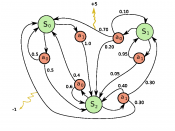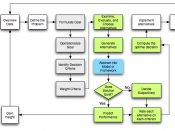Challenged with competing products, companies are finding it more important to understand why a consumer would choose one product over another. To do this, the company needs to recognise the complex decision making process a consumer goes through. The variety of products is always expanding, but with the consumers' limited temporal and cognitive resources, they cannot simply analyse all the products.
As Jon Elster (1989) points out, making rational choices does not only require access to options, but also the necessary time and information needed to choose.
Consumers increasingly face information overload and consequently are unlikely to process all available product or service specifications.
Marketers can strategically design the information given to consumers such that the options they wish to promote appear most attractive. Marketers
Consumers commonly make decisions without thinking about the decision-making process itself. The process consists of five stages:
1. Need recognition
2. Information search
3. Evaluation of alternatives
4. Purchase and
5. Post-purchase evaluation
The decision-making process starts with need recognition, when the consumer is in a perceived state of deprivation. This can be triggered through internal or external stimuli. To satisfy this need, the consumer might engage in an internal or external information search. Not all products require the same amount of degree of search. The higher the involvement of the product, the more time and effort the consumer is willing to put in. The consumer then analyses the additional information and sets up purchase guidelines. After the purchase is made, the consumer would evaluate the product according to his/her expectations.
With wider choices in life also on the increase, there is less time to worry over everyday consumption choices (complexity and choice). As pointed out by (complexity and choice), "people approach abstract decision with limited attention and preconditioned strategies". These strategies are developed by...



Too basic.
Although your analysis is mostly valid it appears at times that you did not go it too much depth in the subject. It is apparent that this is not a paper that was worked on for a long enough time for real and new findings to be had. It would be benificial for the writer to elaborate more and explain the main ideas in more depth to create a better portrait of ideas.
0 out of 1 people found this comment useful.